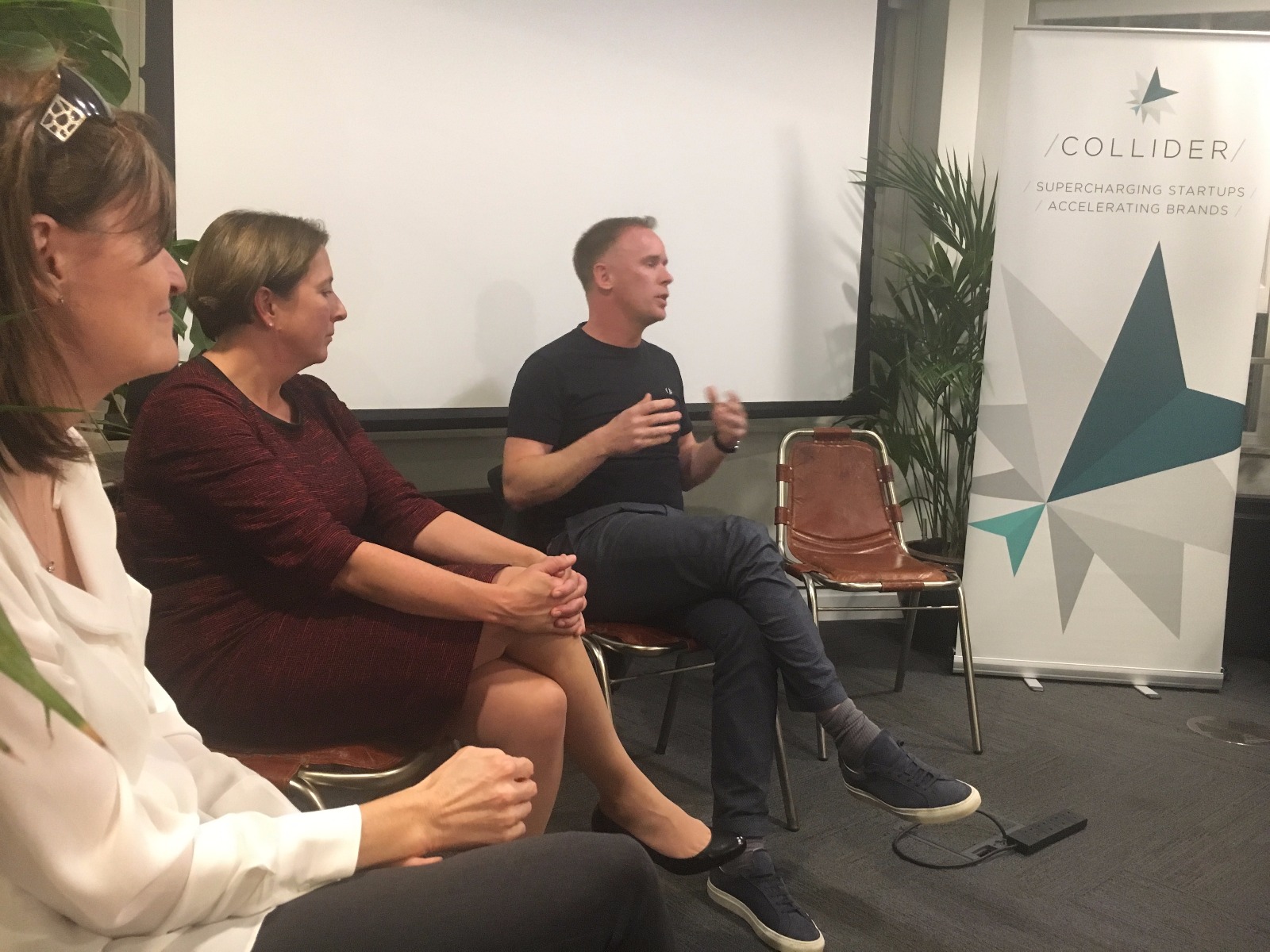Before we started Sumo Insight, we loved to travel. The idea of taking 3 weeks off at a time, packing the bag and saying cheerio to the cat was the reason why we toiled our way through our corporate day jobs. But for me, it wasn’t enough. So we packed our corporate bags and took a different journey. Flying with Collider, we’ve embarked on a journey, one that has awesome experiences, rocky roads & plenty of locals with words of wisdom along the way! Each startup will be writing a guest blog to share the highs and lows that come with being an early stage startup. This is your chance to get a sneaky peek into what it is like to be part of Collider and even grab a chunk of wisdom on the way.
This week’s is written by Colin White, the co-founder of Sumo Insight.
Awesome experiences
Do accelerators help? Being on an accelerator that specialises in your sector is one of the biggest advantages a start-up can have. The ability to match coaches, investors and brands with your business is a boost only a small percentage of start-ups ever receive. You need to be good at time management because before you know it, you’ll be juggling running an early-stage start-up, chasing investment & attending the accelerator programme. However, the right accelerator will make the first two activities easier.
Talking to brands – Have you tried creating a meeting with a large corporate from a cold call? Not easy ah! Sales is about human relationships and most start-ups lack the network a corporate background can instil. Brands want to talk to thought leaders but as a start-up, you won’t necessarily have developed that profile in your sector yet. Collider has opened doors that have come with priceless discovery sessions. Talking to buyers and influencers in the likes of Unilever, Camelot & Haymarket will help you understand how big companies work, how they buy, whether you have the right product market fit, and make you connected in the world your customers work in. Imagine the power of these connections on your Linked-In profile! Connections open doors, no matter how fruitful, or fruitless a meeting may seem at the time, they are all learning experiences and connections for the future. The experience & network Collider bring start-ups will future proof your business to a degree and help you stay front of mind.
Understand your special sauce – People work with people. investor invest in technology imagined by people! Your business is you & your team. One of the key outputs that has benefitted not only our business, but created personal value has been to understand and know my ‘special sauce’ better. Why I am the person running this start-up, what makes me stand out from the crowd and why can I stand in front of a crowded exhibition hall and happily present my business at its best! This is the enormous value our coaching sessions have brought which we’ve had on a weekly session without fail. Again, make time for them in your diary, they will drive your business forward with speed. They will also help you identify the gaps, what you’re maybe not quite as good at and that helps you make the right decisions when building a team around you.
Rocky Road
Know your audience – It’s a hard lesson to learn, one normally learnt through failure before you get it right. Delivering the wrong pitch to the wrong audience can knock your confidence. However, if you don’t do this earlier enough in your start-up process, it can potential happen at a crucial moment, souring a potential relationship with customers or future investors. Knowing the difference between a sales audience and an investor audience is key to getting your messaging correct. I’ve seen it done in public and it’s not a nice experience to get it wrong. Again, that’s the benefit and value that Collider have brought to our business. Failing in front of a friendly, support audience is a lot less embarrassing and a lot less hurtful to your business. It’s a learning experience every member of your start up should experience with the backing of a support network that will include mentors, friendly investors & helpful brands.
Selling isn’t always a natural instinct….but it needs to be! - Learn skills you don’t have. Learn and learn quickly. Selling is actually easier than it sounds and you need to understand that you are selling at every opportunity. One of the first things you learn to sell is your elevator pitch. As a group of start-ups, I found one of the best learning experiences was creating an elevator pitch for one of my fellow start-ups at Collider, Stashmetrics. You can sometimes get too close to your own business. Learning to sell another, and hearing their take on your business really helped us fine-tune our elevator pitch, and our ability to sell the business in one or two sentences.
Avoid being the ‘walking dead’ – spend wisely but add value at every step. With every pound you spend, not only should you consider whether you’re getting good value for your money, you should also consider are you getting good value for the business. This means, everything you do should also be evaluated on the value it adds to your business valuation. Spending money, not just making money can add value to your business if it’s well thought through. Recruiting a critical skillset your team lacks, developing an additional element of IP or protecting a piece of unique tech you’ve already built will help with further rounds of funding, allowing you to negotiate the best deal possible for your business.
It’s a numbers game – I like this quote and I wanted to include it although I can’t remember who I heard it from. Expect to hear the word ‘no’ very often. But learn something from each occasion because the power of ‘yes’ will be defined by the number of times you hear ‘no’.

Create momentum – now knowing this from experience, it is without a doubt, harder to develop a start-up that it is to start a start-up and get to first-base! Growth at speed is critical at development stage. Your cash runway will only last you so long. If you can’t use this time, energy and investment to demonstrate momentum in your business, it is going to be hard to lengthen your runway beyond your existing investment round.
Words of Wisdom
Work/life balance – It is possible to have one! Several founders I know balance kids & family life with running a start-up and potentially holding other positions too. I’ve come to learn that work/life balance isn’t something of structure like weekends, it’s what you make of opportunities as they arise. We all need to be rewarded to ensure our interests and focus remain. Know what those rewards need to be for each member of the team, respect them and make sure that that your business allows them. Don’t put yourself last, and ensure that the whole team shares the work/life balance.
Scale, but do things that don’t scale! A successful technology start-up should have one thing in mind, scale! However, in the process of scaling, you often have to do things that don’t scale. Running an early client project before your tech is automated may not be scalable, but if it provides a case study, or an element of revenue, then it’s probably worth doing for the value it adds.
Focus – A Q&A session with Richard Anson, founder & CEO of Reevoo held at BBC Worldwide demonstrated this well for me. He said as a start-up, it’s too hard to create a B2B and B2C model in parallel. Reevoo had focused on capturing reviews on products and services from consumers for the benefit of the business that sold or built these products or service. At an early stage, Richard realised the business could not sustain the resource and effort required to build both B2B clients & consumer reviews. He changed the business model to focus on the clients who in turn brought in the reviews from consumers.
These words of wisdom combined can be best summarised in a recent quote from Cory Doctorow in an article for The Guardian. ‘Almost everything that start-ups do comes to nothing. A tiny fraction of all that activity pays off in ways that beggar the imagination’.
As Sumo Insight, we’re now certainly established on our journey of discovery and development as we look to transition from start-up to small business. With clients, investors, mentors & coaches in our business eco-system, we’re well under way in terms of creating a sustainable and successful business model. The rewards of seeing our hard work pay-off genuinely substitute for the lifestyle we’ve forfeited, and as we actively seek to bring new clients with us on our journey, the same can be said for new investors too. But every now and then, we do miss those 3 week holidays!!






